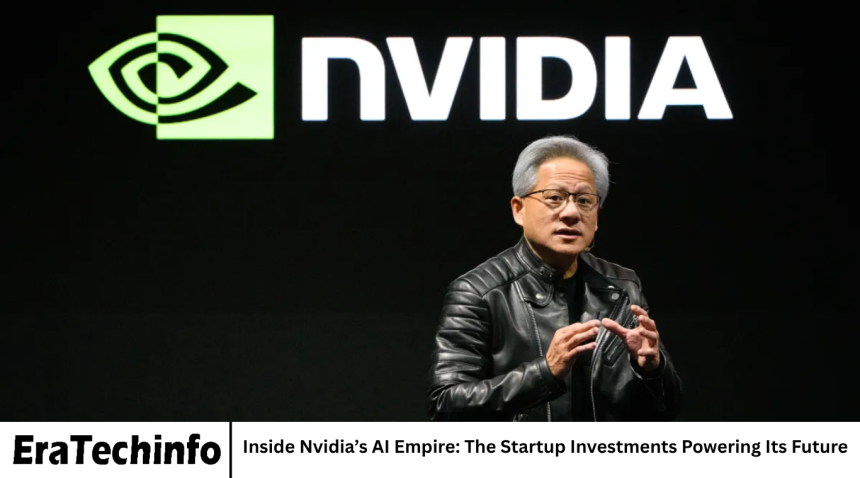Nvidia has become one of the most influential companies in the world, shaping the direction of artificial intelligence (AI) through its groundbreaking technologies and bold investment strategy. Once known mainly for its powerful graphics processing units (GPUs) used in gaming, Nvidia has evolved into the backbone of modern AI development. Its chips now power everything from advanced data centers and autonomous vehicles to robotics, healthcare, and climate research.
But what truly sets Nvidia apart today is not just its hardware—it’s the vast network of startups it supports. By investing in promising companies across multiple sectors, Nvidia is building an ecosystem that ensures its dominance in AI for years to come. These investments are not random; they reflect a strategic vision to drive innovation, expand AI adoption, and secure Nvidia’s role at the center of a rapidly growing global market.
This article explores how Nvidia is shaping the future of AI through its startup investments, the industries it’s targeting, and the broader impact of its empire on technology and society.
Nvidia’s Rise from Gaming Giant to AI Powerhouse
Founded in 1993, Nvidia began as a gaming-focused company developing GPUs that could deliver high-quality visual performance. Over the years, it became synonymous with cutting-edge graphics, powering gaming consoles, PCs, and creative applications.
However, the company’s true breakthrough came when researchers discovered that GPUs could perform massive parallel computations—perfect for training AI models. This realization transformed Nvidia from a gaming company into a global leader in artificial intelligence.
Today, Nvidia’s hardware and software platforms power nearly every major AI breakthrough, from large language models to autonomous systems. Its CUDA programming platform and high-performance chips have become essential tools for scientists, developers, and tech companies worldwide.
Building the AI Ecosystem Through Startup Investments
To stay ahead in the fast-moving AI race, Nvidia has not relied solely on its internal research. Instead, it has built a vast investment network, supporting startups that push the boundaries of AI applications.
Through its Nvidia Inception Program and direct venture capital partnerships, the company provides funding, technical support, and access to advanced computing infrastructure. Thousands of startups have joined the program, benefiting from Nvidia’s expertise while contributing innovative solutions that expand the AI ecosystem.
This strategy not only accelerates technological progress but also strengthens Nvidia’s market position. Every startup using Nvidia technology adds value to the ecosystem, increasing demand for its chips and software platforms.
Key Sectors Where Nvidia Is Investing
Nvidia’s investments span a wide range of industries, reflecting the growing influence of AI across all parts of the economy. Let’s take a closer look at some of the most significant areas of focus.
Autonomous Vehicles
Nvidia’s vision for the future of transportation is deeply tied to artificial intelligence. Through its Drive platform, the company provides hardware and software solutions for autonomous driving.
To strengthen this vision, Nvidia has invested in startups working on sensors, mapping technologies, and machine learning algorithms that help cars “see” and “think.” Companies like TuSimple (autonomous trucking), Cruise (robotaxis), and Momenta (driverless systems) have benefited from Nvidia’s ecosystem, using its GPUs to train complex neural networks for real-world driving.
These collaborations not only accelerate the development of safer self-driving cars but also position Nvidia as the technological backbone of the autonomous vehicle revolution.
Healthcare and Life Sciences
Nvidia’s expansion into healthcare shows how AI can transform medicine. Through its Clara platform, the company supports startups using AI for medical imaging, drug discovery, and genomics.
Startups like Atomwise, which uses AI for molecule discovery, and Recursion Pharmaceuticals, which automates drug research, rely on Nvidia’s computing infrastructure. The company’s GPUs allow researchers to process huge datasets quickly, enabling faster diagnoses and treatment development.
By investing in these startups, Nvidia is helping to accelerate the future of precision medicine, where AI can predict diseases and personalize healthcare.
Robotics and Industrial Automation
Robotics is another key area of Nvidia’s investment strategy. The company’s Isaac platform provides the tools for designing, training, and deploying intelligent robots.
Startups like Covariant (AI-powered warehouse robots) and Agility Robotics (humanoid machines for industrial use) are using Nvidia’s technology to build systems that can learn from their environments and adapt in real time.
This growing ecosystem of robotics startups is pushing industries like manufacturing, logistics, and construction toward automation—driven by Nvidia’s hardware and AI expertise.
Cloud Computing and Data Infrastructure
AI workloads require massive computing power, and Nvidia’s investments reflect that reality. The company has partnered with startups in cloud computing, networking, and data management to ensure that AI infrastructure can scale efficiently.
Companies such as CoreWeave and Lambda have become major players in cloud GPU services, offering scalable computing solutions for AI startups and enterprises alike. Nvidia benefits directly, as these firms rely on its GPUs to power their data centers.
This synergy strengthens Nvidia’s dominance in cloud AI infrastructure, making its hardware the default choice for new and growing companies.
Generative AI and Creative Tools
The explosion of generative AI—tools that create text, images, music, and video—has opened new frontiers for Nvidia. The company has invested in startups building generative platforms for content creation, design, and entertainment.
Startups like Runway, Synthesia, and Rephrase.ai use Nvidia’s GPUs to train deep learning models capable of generating high-quality visuals and animations. These technologies are transforming film production, advertising, and game design, industries where Nvidia already has a strong presence.
Through these investments, Nvidia is blending creativity with computation, ensuring that the next wave of digital storytelling is powered by its AI technologies.
The Strategy Behind Nvidia’s Investments
Nvidia’s investment strategy is guided by a simple but powerful principle: grow the AI ecosystem from within. By supporting startups that rely on its hardware and software, Nvidia creates a cycle of innovation that constantly reinforces its own business model.
Each startup that adopts Nvidia’s technology becomes part of a network that generates more data, more applications, and more demand for AI computing. This approach allows Nvidia to expand its influence across multiple sectors without needing to dominate each one directly.
Moreover, investing early in emerging companies gives Nvidia a front-row seat to the next generation of innovations. Whether it’s breakthroughs in generative AI, autonomous systems, or robotics, Nvidia often identifies trends before they become mainstream.
How Nvidia Benefits from Its Startup Network
The benefits of Nvidia’s startup ecosystem go far beyond financial returns. By supporting innovative companies, Nvidia gains access to new ideas, research data, and partnerships that shape the direction of future products.
For example, startups testing new AI models on Nvidia’s hardware provide valuable feedback that helps improve GPU performance and efficiency. In turn, these improvements attract more developers, reinforcing Nvidia’s market dominance.
Additionally, startups often build their products around Nvidia’s proprietary software frameworks such as CUDA, TensorRT, and Omniverse. This creates a form of technological lock-in—making it more likely that future innovations will continue to depend on Nvidia’s tools.
Challenges Facing Nvidia’s Investment Strategy
While Nvidia’s investment empire is impressive, it is not without risks. The AI market is rapidly evolving, and competition is fierce. Rival companies like AMD, Intel, and Google are also investing heavily in AI hardware and software, hoping to capture market share.
There’s also the challenge of regulation. Governments around the world are starting to scrutinize large technology companies for their influence and market power. Nvidia’s growing reach across multiple sectors could draw attention from regulators concerned about monopolistic behavior.
Finally, not all startup investments succeed. The AI startup landscape is highly unpredictable, and even well-funded ventures can fail to deliver results. Nvidia must balance its desire for growth with careful oversight of where and how it invests.
The Broader Impact of Nvidia’s AI Empire
Nvidia’s influence extends far beyond corporate profits. Its technologies are shaping the future of how humans work, learn, and create. By supporting startups in diverse fields—from medicine and energy to entertainment—Nvidia is helping to democratize access to powerful computing tools.
Its chips and software make it possible for small teams to train massive AI models, enabling innovation that once required billion-dollar resources. In many ways, Nvidia is not just a technology company—it’s the foundation upon which the global AI revolution is being built.
However, this level of influence also comes with responsibility. As AI becomes more embedded in society, ethical questions about bias, transparency, and accountability will require careful consideration. Nvidia’s leadership in AI puts it at the center of these debates.
The Future of Nvidia’s AI Ecosystem
Looking ahead, Nvidia shows no signs of slowing down. The company continues to expand its hardware lineup, launching new GPUs and AI accelerators designed for large-scale model training and real-time inference.
At the same time, Nvidia is deepening its partnerships with startups focused on frontier technologies like quantum computing, edge AI, and sustainability. These areas represent the next wave of technological change, and Nvidia aims to ensure it remains a central player.
Its long-term vision is clear: to create an interconnected AI ecosystem where innovation thrives on Nvidia’s platforms—from research labs and startups to enterprise applications and consumer devices.
Frequently Asked Questions
What is Nvidia’s Inception Program?
Nvidia’s Inception Program supports AI startups by providing funding, technical guidance, and access to Nvidia’s computing infrastructure to accelerate innovation.
Why is Nvidia investing in startups?
Nvidia invests in startups to strengthen its AI ecosystem, encourage innovation, and expand the use of its hardware and software across industries.
Which industries does Nvidia focus on?
Nvidia focuses on sectors like autonomous vehicles, healthcare, robotics, cloud computing, and generative AI to diversify its presence in the AI economy.
How do startups benefit from Nvidia’s support?
Startups receive access to powerful GPUs, research collaborations, and mentorship, helping them build and scale AI products more efficiently.
What risks does Nvidia face in its investment strategy?
Nvidia faces risks such as market competition, regulatory scrutiny, and the potential failure of some startups within its investment network.
How does Nvidia influence the global AI market?
Nvidia provides the essential computing power and software tools that drive most modern AI research, giving it a dominant role in the industry.
What is the future outlook for Nvidia’s AI empire?
Nvidia is expected to continue expanding its AI ecosystem, investing in emerging technologies like quantum computing, edge AI, and sustainable tech innovation.
Conclusion
Nvidia’s transformation from a gaming company to an AI powerhouse is one of the most remarkable success stories in modern technology. By strategically investing in startups, the company has built an empire that spans nearly every industry touched by artificial intelligence.
Each investment strengthens Nvidia’s position, fuels innovation, and ensures that its technology remains at the core of the AI revolution. But with this influence comes responsibility—to ensure that AI development remains ethical, transparent, and beneficial to humanity.
As Nvidia continues to shape the future through its network of startups, one thing is certain: its impact on the world of artificial intelligence is only just beginning.










